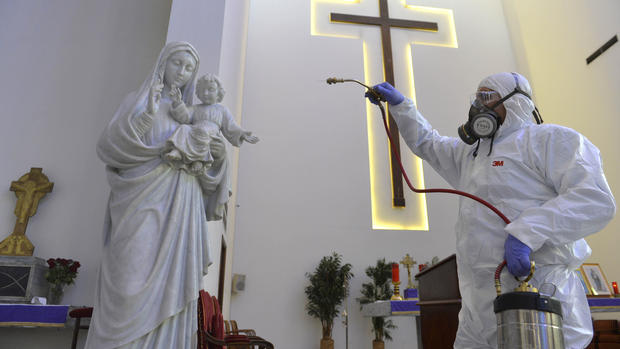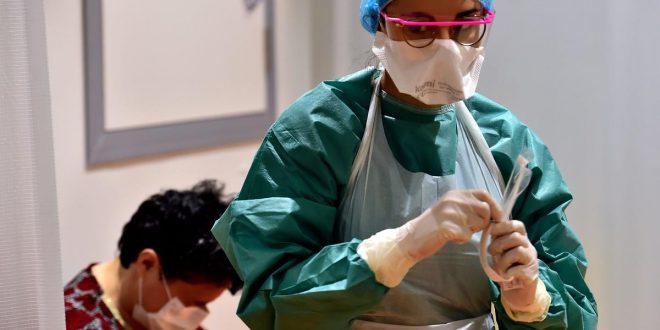Doctor separates coronavirus facts, fiction
As the number of confirmed cases of coronavirus grows day by day, the virus’s potentially invisible presence has led many to wonder what they should do if they believe they’ve been exposed.
Not everyone who is exposed to the virus will catch it, and some people who are infected will have only minor or no symptoms. On average, symptoms like fever, cough, or shortness of breath tend to develop five to six days after exposure, according to Dr. Brian Yun, and emergency physician at Massachusetts General Hospital. But the Centers for Disease Control and Prevention says it can take as long as 14 days for symptoms to emerge. If, after that period of time, you have not developed any of the typical COVID-19 symptoms, you are likely in the clear, Yun said.
Time spent sitting and waiting to see if you may get ill can lead to anxiety and fear. The wait, however, is the reality of the situation.
Testing for coronavirus is being reserved for people who are sick, not those who are symptom-free. If someone did not have any symptoms and got tested, the result of that test could be a false negative, according to Yun. Then that purportedly virus-free person could re-enter society and infect others, before later developing symptoms and testing positive for the virus.
“Even though it may feel good (to get tested), or may lessen someone’s anxiety… it’s a false reassurance,” Yun said.
On top of the potential unreliability of pre-symptomatic testing, the tests themselves are scarce.
According to Dr. David Buchholz, a primary care physician at Columbia University’s Irving Medical Center, hospitals across the country, including his own, are rationing tests for those who need them the most. Those people include health care workers.
Hospitals are sending health care workers home at the first sign of a cold, according to Buchholz, but as the number of coronavirus cases increase, the need for health care workers will only grow. So it will be important to have tests available to ensure that doctors and nurses are safe to return to work.
“We may give health care workers a test to make sure they’re able to come back with mild cold symptoms,” Buchholz explained.
Officials say testing capacity across the U.S. is ramping up, but if you show up at a hospital or doctor’s office without symptoms, you will most likely be denied a coronavirus test.
“We unfortunately have to explain to people that we have a shortage and can’t test them,” Buchholz said.
He recommends that people who think they were exposed to the virus contact their health care provider or a hospital in order to be evaluated by phone.
Oftentimes, people who fear that they have been exposed to the virus don’t meet the criteria for exposure, according to Dr. Sharon Wright, senior medical director of infection control and hospital epidemiology at Beth Israel Deaconess Medical Center in Boston.
Exposure to a respiratory virus, such as the novel coronavirus, generally requires close contact — within six feet of distance — with the infected individual for at least 10 minutes, according to Wright. If the individual is a family member, someone you live with, or a close coworker, the criteria could change due to the frequency with which you share common surfaces, she said.
According to the CDC, close contact “can occur while caring for, living with, visiting, or sharing a health care waiting area or room with a COVID-19 case,” or by “having direct contact with infectious secretions of a COVID-19 case (e.g., being coughed on).”
If you have not been exposed to a confirmed case of the coronavirus but are worried about catching it, your best defense is a healthy lifestyle. Getting enough sleep, eating healthy foods, washing your hands thoroughly, disinfecting commonly touched surfaces, avoiding touching your face, and practicing social distancing all help protect you from catching the virus.
Claims that supplements, such as vitamin C or zinc, might help protect against the virus are not supported by research, Buchholz, Yun and Wright all agreed.
Buchholz said, “Don’t waste your money.”
If you develop symptoms in line with the coronavirus, and are an otherwise healthy person, treat yourself as if you have the flu: Stay home, rest, and monitor your symptoms. According to Wright, most people who are otherwise healthy will improve. If you have a persistent fever over a few days, or if symptoms become more severe, contact a doctor. The CDC says people should seek immediate medical attention if they experience difficulty breathing, shortness of breath, persistent pain or pressure in the chest, or other emergency warning signs.
Wright said that above all, social distancing measures must be taken seriously to help keep the pandemic from overwhelming the health care system.
“I think coronavirus is going to be here with us for a while,” she said. “The question now is can we make sure everyone doesn’t come to the hospital at the same time.”

Coronavirus: Responses around the world
53 photos
 The Argus Report Read about it!
The Argus Report Read about it!





